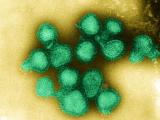Jun 24, 2011 (CIDRAP News) – The federal government's Advisory Committee on Immunization Practices (ACIP) yesterday approved a statement that says injected influenza vaccines are safe for people who have a mild egg allergy, provided they are observed afterward for any reactions, but the statement is not yet official policy.
Formal adoption of the statement is contingent on assurances from vaccine manufacturers that the albumin content in flu vaccines for next season falls within safe levels, Dr. Lisa A. Grohskopf of the Influenza Division at the Centers for Disease Control and Prevention (CDC) told CIDRAP News today.
The ACIP makes vaccination recommendations on behalf of the CDC. The recommendations become official when they are published in the agency's Morbidity and Mortality Weekly Report.
Medical authorities have long urged caution regarding flu shots for those with egg allergies because of the concern that residual egg protein in the vaccines, which are grown in eggs, might cause a reaction. But a number of recent studies have shown that many egg-allergic people can be safely vaccinated.
Last October the American Academy of Allergy, Asthma, and Immunology (AAAAI) issued guidelines saying that most people with an egg allergy can be safely vaccinated against flu without first undergoing a skin test. The organization advised that allergic patients can be vaccinated with either a two-step, graded approach or with a single dose, followed in either case by 30 minutes of observation for allergic symptoms.
Grohskopf explained that the existing ACIP guidance says that those who have had symptoms such as hives, swelling of the lips or tongue, or acute respiratory distress after eating eggs should consult a physician for an appropriate evaluation to help determine if flu vaccination is safe. The guidance says those with a history of anaphylactic reactions to eggs should not get a flu shot, she added.
The existing guidance becomes an obstacle for someone with an egg allergy if they go to a vaccination site where no physician is available to evaluate them, she noted.
The language approved by the ACIP yesterday says that individuals with a mild egg allergy, such as manifested only by hives, should be able to receive a flu shot, provided it is an inactivated vaccine and the person is observed for 30 minutes after vaccination, Grohskopf said. The statement says the vaccine should be given by a provider who is familiar with egg allergies.
"The main difference [from the existing guidance] is breaking out people with less severe allergies, specifically hives," she said.
"However, this is not a final recommendation. It does have to go back to them and be approved," she commented.
She said the CDC will be revising the statement in accord with the ACIP discussion and will also check with manufacturers about the albumin content in the vaccines for the coming season. "That's a very important contingency," she said. "If one manufacturer has a high level, that could be a problem."
The albumin content in flu vaccines has declined over the years, but it still varies from lot to lot, she said. She also noted that manufacturers are not required to list the albumin content on the vaccine package inserts, and some do not.
Grohskopf noted that the ACIP statement covers only trivalent inactivated flu vaccine (TIV), not the live attenuated vaccine (FluMist), given as a nasal spray. That's not because of any evidence of increased risk with FluMist, she said.
"Of studies that have looked at giving influenza vaccine to people with egg allergies, they've all used TIV, so it's just lack of data, not that anything has been demonstrated to happen [with FluMist]," she explained.
If no problems concerning albumin content arise, the ACIP statement will probably get the panel's final approval and be published within a few weeks, Grohskopf said.
See also:
Oct 15, 2010, CIDRAP News story "Flu vaccines called generally safe for egg-allergic patients"
January 2011 AAAAI statement on flu vaccination for egg-allergic patients



















